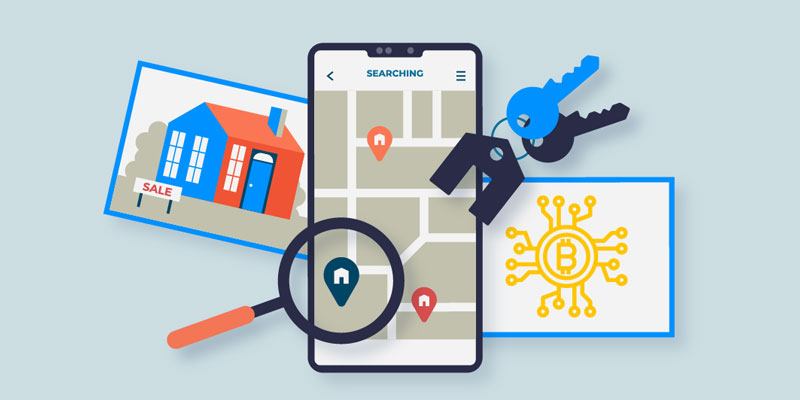The world of real estate is undergoing a dramatic transformation, thanks to the advent of blockchain technology. Blockchain, the decentralized and transparent ledger technology that powers cryptocurrencies like Bitcoin and Ethereum, is quickly making its mark in various industries—including real estate. By offering a more secure, efficient, and transparent way of conducting transactions, blockchain is poised to reshape how we buy, sell, lease, and invest in properties. As we look towards 2025, here’s how blockchain is revolutionizing the real estate sector.
What is Blockchain Technology?
Blockchain technology is essentially a distributed ledger that records transactions across many computers in such a way that the registered transactions cannot be altered retroactively without the alteration of all subsequent blocks. This ensures the integrity and security of data. While blockchain is most commonly associated with cryptocurrencies, it has far broader applications, particularly in industries that rely on secure transactions, like real estate.
Key Benefits of Blockchain in Real Estate
1. Increased Transparency
Blockchain’s decentralized nature ensures that all real estate transactions are recorded in a transparent manner, accessible by all relevant parties. This reduces the potential for fraud and increases the overall integrity of real estate dealings. Buyers, sellers, and investors can verify the history of property ownership, reducing disputes over property titles.
For more information on blockchain technology in real estate, visit Blockchain Real Estate Association.
2. Enhanced Security
Traditional real estate transactions are prone to fraud, title disputes, and errors. Blockchain minimizes these risks by offering a tamper-proof system. Each transaction is verified through a consensus process, ensuring that the records are immutable and secure. This is particularly crucial for large investments like real estate, where the stakes are high.
3. Faster Transactions
Traditional real estate transactions can be time-consuming, involving multiple intermediaries such as brokers, notaries, banks, and government agencies. Blockchain reduces this complexity by eliminating the need for middlemen. Smart contracts—self-executing contracts with the terms of the agreement directly written into code—allow for faster execution of transactions. Property sales that once took weeks can now be completed in a matter of hours.
Explore smart contracts further at Ethereum Foundation.
4. Fractional Ownership and Tokenization
One of the most exciting innovations blockchain brings to real estate is tokenization, which allows for the creation of digital tokens that represent shares in a property. Tokenization makes real estate investments accessible to a broader range of investors by enabling fractional ownership. Instead of purchasing an entire property, investors can own a fraction, making it easier to diversify portfolios with smaller capital outlays.
A leading example of tokenization in real estate is RealT, a platform that allows users to buy fractional ownership in properties via tokens. For more on this model, visit RealT.
How Blockchain is Improving Property Transactions in 2025
1. Title Management and Ownership Records
In 2025, property title management will be significantly more efficient with blockchain. Instead of relying on paper records or centralized databases, property ownership information will be securely stored on the blockchain. This allows for quicker, more transparent verification of property ownership, ensuring that there are no conflicting claims.
2. Cross-Border Transactions
Real estate investments are no longer limited by geographic location. Blockchain enables cross-border transactions, allowing individuals to invest in properties in different countries without the barriers of currency conversion, long processing times, and high fees. With blockchain, investors can seamlessly engage in international real estate markets, all while maintaining trust and security.
3. Smart Contracts for Leasing and Sales
Smart contracts are gaining traction in real estate leasing and sales. For example, blockchain-based smart contracts can be used to automatically trigger payments when certain conditions are met, such as when a lease payment is due or when property conditions are verified. This streamlines the leasing process, reduces administrative costs, and ensures transparency between landlords and tenants.
Learn more about how smart contracts are applied in real estate leasing at The Blockchain Group.
Challenges of Blockchain in Real Estate
While blockchain offers transformative benefits, its integration into the real estate industry is not without challenges:
1. Regulatory Concerns
Blockchain’s decentralized nature can make it difficult for governments and institutions to regulate. As blockchain adoption grows, regulatory bodies will need to develop clear frameworks to govern its use in real estate. Countries like Switzerland have already made strides in this area with blockchain-friendly laws, but broader global acceptance is still in progress.
For more on regulatory efforts, check out Coin Center, a leading organization advocating for clear cryptocurrency regulations.
2. Adoption by Traditional Players
The real estate sector has been slow to adopt new technologies, and many traditional players—like brokers, notaries, and lenders—may resist the shift toward blockchain due to familiarity with legacy systems. However, as blockchain proves its worth in reducing fraud and speeding up transactions, its adoption is expected to rise.
3. Technological Barriers
For blockchain to be fully integrated into real estate transactions, it requires robust technology infrastructure, which may not be readily available in all markets. Additionally, educating real estate professionals about the benefits and functionalities of blockchain is key to successful implementation.
The Future of Blockchain in Real Estate
By 2025, blockchain is expected to have a significant impact on the real estate industry, making property transactions faster, more secure, and more accessible. We’re already seeing major players like Propy and REZI integrate blockchain into their platforms to streamline processes and increase transparency.
For instance, Propy has been utilizing blockchain for cross-border real estate transactions and title management. To learn more about their work, visit Propy.
As adoption increases, we can expect more real estate companies and investors to explore the potential of blockchain technology for fractional ownership, smart contracts, and even property management.
FAQs
Q1: How can blockchain help with property title verification?
Blockchain ensures the transparency and immutability of property title records, reducing the risk of fraud or disputes over ownership.
Q2: Can blockchain help in international real estate transactions?
Yes, blockchain enables seamless cross-border transactions by providing a decentralized platform that bypasses currency exchange and high transaction fees.
Q3: What are smart contracts in real estate?
Smart contracts are digital agreements coded on the blockchain that automatically execute actions when predefined conditions are met, such as transferring ownership or making payments.
Q4: Will blockchain reduce real estate transaction costs?
Yes, by eliminating intermediaries and simplifying processes, blockchain reduces the administrative costs associated with real estate transactions.
Q5: Are there any legal issues with blockchain in real estate?
The regulatory landscape for blockchain in real estate is still developing, and varying laws across regions can present challenges for broader adoption.
Conclusion
Blockchain technology is set to revolutionize the real estate industry by offering increased transparency, enhanced security, and faster transactions. As we move toward 2025, we can expect more widespread adoption, enabling a more efficient and inclusive market. Whether it’s through tokenization, smart contracts, or title management, blockchain’s impact on real estate will continue to grow, reshaping how we buy, sell, and invest in property.
For further resources, check out Blockchain in Real Estate and Real Estate Blockchain News.


